Stop Dog Begging for Food with These Simple Training Tips
Begging at the dinner table is one of the most common—and frustrating—dog behaviors. While it might seem harmless or even cute at first, feeding your dog from your plate can lead to long-term behavior problems, poor nutrition, and even weight gain. Teaching your dog not to beg for food helps build healthy habits and improves your relationship with your pet.
Understanding Why Dogs Beg
To understand how to stop begging, it helps to first understand why dogs do it. Begging isn’t just about food—it’s about attention, routine, and survival instincts. Dogs are hardwired to seek food wherever they can find it, especially when it comes from their favorite people.
Dogs are pack animals, and in the wild, they rely on their group to share meals. Over time, domestic dogs have learned to use body language—like staring, whining, or pawing—to get what they want from humans. If begging has worked before, your dog learns to keep doing it.
Begging is often unintentionally reinforced. Even small scraps or a bite from your plate tells your dog that this behavior gets results. That’s why consistency is key to stopping it.
How Begging Works in Your Dog’s Brain
Begging is a learned behavior driven by a reward system in your dog’s brain. When a dog gets food after begging, the brain releases dopamine—a “feel-good” chemical that reinforces the behavior. It’s the same chemical involved in forming habits in humans.
This creates a cycle: your dog begs, gets a reward, and then begs more often. Over time, this cycle becomes hard to break unless you interrupt the pattern and stop the rewards.
On top of that, dogs are excellent at reading human cues. If you sigh, glance at your plate, or even smile, your dog may see that as a sign they’re getting close to their goal. That’s why removing emotional reactions can also help break the habit.
Common Reasons Dogs Beg
Not every dog begs for the same reason. Understanding what’s behind the behavior can help you respond more effectively.
- Hunger: Your dog may not be getting enough calories at meal times, or their diet may lack nutrients, leaving them unsatisfied.
- Routine: If you often eat at the same time and feed your dog from your plate, they start to expect it.
- Attention-seeking: Dogs quickly learn that begging gets them noticed, even if it’s a scolding.
- Learned behavior: If begging has worked in the past, your dog sees no reason to stop.
- Anxiety or boredom: Dogs may beg out of stress, especially if meals are a big part of their day.
Whatever the cause, the key is to stay calm, stay consistent, and not reward the behavior—even accidentally.
How to Teach Your Dog Not to Beg for Food
Training your dog not to beg takes time and patience, but it’s very doable with the right approach. Here’s how to break the habit and build new, healthy behaviors.
- Stop feeding from the table: This is the most important step. If your dog gets even a small bite, the behavior is rewarded and reinforced.
- Feed your dog before you eat: A satisfied dog is less likely to beg. Try scheduling their meals 15–30 minutes before yours.
- Use a consistent feeding schedule: Dogs thrive on routine. Feeding them at the same time every day helps them know when to expect food—and when not to.
- Create a “place” command: Teach your dog to go to a designated spot like a bed or mat during mealtime. Reward them for staying calm and staying in place.
- Ignore begging behavior: Don’t make eye contact, don’t talk, and don’t react. Even negative attention can be rewarding for some dogs.
- Use puzzle feeders or toys: These keep your dog occupied and mentally stimulated while you eat, reducing the chances they’ll come looking for food.
- Involve the whole household: Everyone needs to follow the same rules, or your dog will quickly learn who’s the “soft spot.”
With consistent training, most dogs will stop begging within a few weeks. Keep sessions short and always reward the behavior you do want—like calmness, patience, and staying in their spot.
When to Be Concerned About Begging
In some cases, begging may signal a bigger issue. If your dog suddenly starts begging after never doing it before, it’s worth checking in with your veterinarian.
Some dogs beg more when they’re not feeling well. Changes in appetite, digestive trouble, or even hormonal imbalances like hypothyroidism can affect their hunger levels.
Here are signs to watch for:
- Sudden increase in appetite
- Weight gain or weight loss without a diet change
- Begging combined with vomiting, diarrhea, or lethargy
- Obsessive food-seeking or guarding behavior
If you notice any of these symptoms, talk to your vet. They can rule out medical problems and help guide your next steps.
Final Thoughts
Begging may seem like a small problem, but it can grow into a daily stressor for you and your dog. By understanding why it happens and responding with consistent, kind training, you can help your dog learn better habits—and enjoy more peaceful meals together.
Remember, change won’t happen overnight. But with time, your dog can learn that mealtime doesn’t mean pleading at your feet. And you’ll both be happier for it.
If you’re having trouble or your dog seems overly anxious or food-obsessed, talk to your vet or a certified dog trainer. They can offer tailored strategies to support your pet’s physical and emotional well-being.






